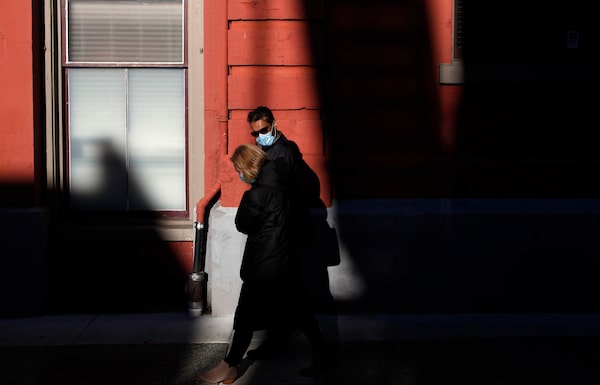
A couple walk near City Hall in Victoria, B.C., on Dec. 2, 2020.CHAD HIPOLITO/The Canadian Press
Young adults and families with children in B.C. were disproportionately affected during the pandemic’s first wave, a survey of almost 400,000 British Columbians shows.
The BC Centre for Disease Control Foundation for Public Health released the results of the survey Friday. Residents were asked how the pandemic and related health measures impacted their lives. According to the foundation, 395,000 people participated in the late-spring survey, making it the largest health survey by population in Canada.
“Key findings from this survey are informing and strengthening the province’s pandemic response as we navigate the second wave of this virus,” said Kristy Kerr, executive director of the BCCDC Foundation, which funded the survey.
B.C. deputy provincial health officer Reka Gustafson said because of the large size of the data set, it took months for the survey results to be released.
A dashboard, which shows the results of the survey, is now available on the foundation’s website. This interactive tool breaks data down by health authority, region, ethnicity, age and other demographics.
Dr. Gustafson said important determinants of how well people were doing during the pandemic were age, income and household composition.
She said that although the disease has heavily hit seniors clinically, the societal response to COVID-19 is affecting everyone, particularly two groups of the population. The survey suggests that young people between 18 and 29-years-old were nearly twice as likely to be out of work because of the pandemic, compared with residents over all in B.C. It shows that they’re 30 per cent more likely to report increased difficulty in meeting financial needs.
Meanwhile, it says families with children were more likely to report worsening mental-health burdens – 51 per cent compared with 45 per cent for B.C. overall – increases in reduced sleep and alcohol consumption, and were more likely to report being extremely stressed. And about 60 per cent of such families reported their child being more stressed.
“The results that resonated most with me was looking at the results around young adults, the degree to which the important domains affected them … their ability to make ends meet, their stress level, their mental health,” Dr. Gustafson said at a digital media briefing Friday morning.
“As we think through our response to this pandemic, throughout the world, we are recognizing the importance of making sure that we look after our young people.”
Jat Sandhu, consultant in epidemiology and population health management at BCCDC, said health experts are looking at creating a young-adult task force to see how they can better support this group.
The survey was conducted from May 12 to May 31 when B.C. began to flatten the first wave of the COVID-19 pandemic. Dr. Sandhu acknowledged that the experiences then are likely very different from the experiences now. However, he said the survey speaks to the fact that the impact of this health crisis, particularly from a socioeconomic point of view, is going to outlast the pandemic.
Dr. Gustafson agreed, saying that she wished the data had come out sooner. However, she believes some messages that this survey highlights remain both relevant and timely.
Dr. Sandhu noted that the information has been used to inform BCCDC pandemic guidance documents since May.
Dr. Gustafson said public-health officials have been using the data to help make decisions around school closings. The results have also been used to assess the risk of COVID-19 in schools and how the closings have affected the well-being of families.
When looking at the survey results, Dr. Gustafson said public health officials should continue to pay attention to health inequities in the province.
We have a weekly Western Canada newsletter written by our B.C. and Alberta bureau chiefs, providing a comprehensive package of the news you need to know about the region and its place in the issues facing Canada. Sign up today.
 Xiao Xu
Xiao Xu